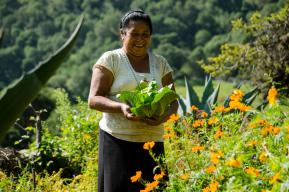News
Spanish biosphere reserves tackle climate change through sustainable mobility and education

Electric vehicles and cycling are at the heart of a new project to mitigate climate change impacts. Five UNESCO Biospheres Reserves located in Spain, Germany and Poland are collaborating to raise awareness among younger generations about the effects of climate change and the importance of switching to clean forms of transportation. The project also focuses on recovery of biodiversity and the challenges posed by global warming.
The project entitled “Supporting European UNESCO Biosphere Reserves as model sites for biodiversity recovery and climate change mitigation” is coordinated by the UNESCO Man and the Biosphere (MAB) Programme and funded by the Volkswagen Group.
On 25–27 January 2023, representatives of three of the biosphere reserves, located in Spain, participated in a seminar Sustainable Mobility for Climate Change Adaptation and Mitigation to present initiatives to transition towards sustainable mobility, increase biodiversity, support educational activities and raise awareness about climate change. The seminar was hosted by the Valles del Leza, Jubera, Cidacos y Alhama Biosphere Reserve, with representatives from the Bardenas Reales and Ordesa-Viñamala Biosphere Reserves, all located in La Rioja, Spain.
Guest representatives from the Montseny, Terres de l'Ebre and Gerês-Xurés Biosphere Reserves and the Spanish Autonomous Organism for National Parks (OAPN) also attended the seminar where they shared initiatives being implemented to ensure sustainable and inclusive mobility.
Environmental education to raise awareness about the effects of climate change
The three Spanish biosphere reserves are working with schools to raise awareness among younger generations about the effects of climate change and biodiversity loss, as well as giving them the tools to be drivers of change.
In 2022, for example, children participated in Reforestation Days at the Valles del Leza, Jubera, Cidacos y Alhama Biosphere Reserve, learned how to create the conditions for biodiversity recovery and took part in cycling workshops with the aim of reducing CO2 emissions.
Children and young people are also the target of the ReBive Environmental Education Plan in the Ordesa-Viñamala Biosphere Reserve, which involves them in biodiversity conservation, and teaches them about the importance of mountains and glaciers for climate regulation.
Meanwhile, in the Bardenas Reales Biosphere Reserve, a group of young people are learning how to develop a microchip for monitoring birds affected by climate change.

Reducing the carbon footprint of biosphere reserve visitors
Another objective of the project is to support the transition towards sustainable mobility in biosphere reserves. Each biosphere reserve is being equipped with an electric or hybrid vehicle to reduce emissions and noise pollution. The Ordesa-Viñamala and Bardenas Reales Biosphere Reserves are also carrying out studies to identify locations for charging points to improve transport connectivity and sustainability in rural areas.
The project will continue for another four years.









